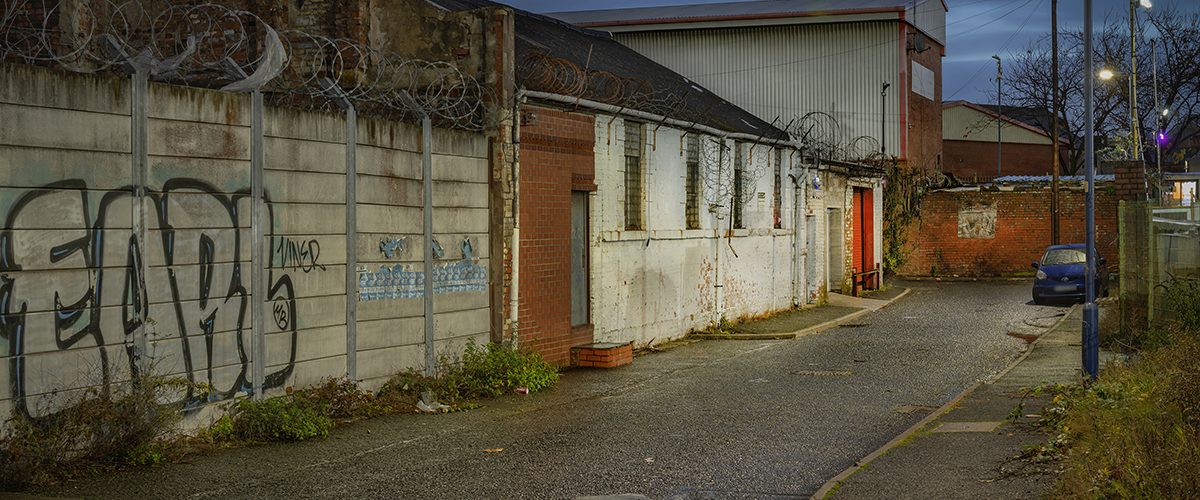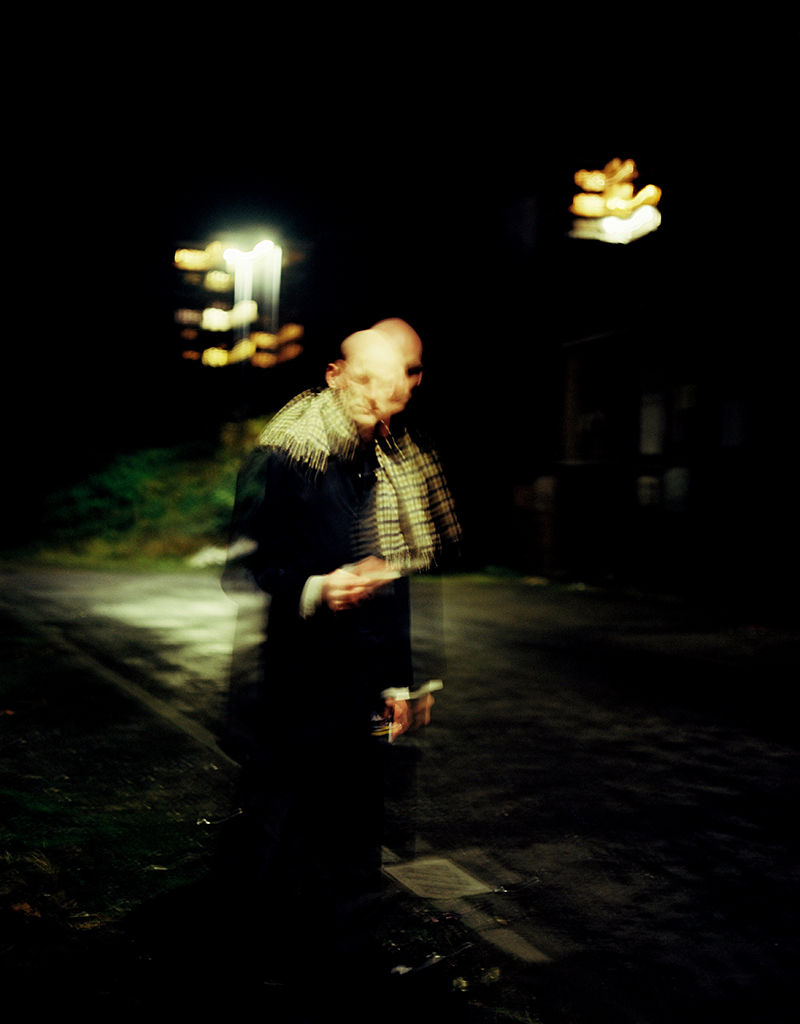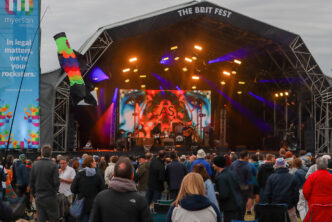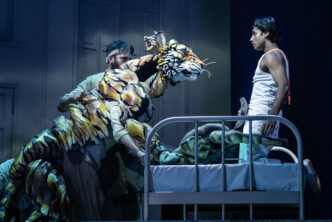Cards on the table, I am somewhat unsettled in both my bones and my city as it is. For parts of this last year, living in the city was like existing in some dystopian Alex Garland movie. Free to walk down the middle of Deansgate, hardly another soul to be seen.
Now double-jabbed and ready for reality’s return, I am therefore not entirely sure having those foundations shaken once again is quite what the doctor ordered.
So if you need your nerves calmed, may I suggest something like Peter Rabbit 2. Because the function and motivation of Dark Days Luminous Nights is indeed to destabalise, to unsettle. And that starts from the moment you arrive at the White Hotel, located in an industrial Salford backlot in the shadow of Strangeways. A white hotel this is not… rather a mechanic’s garage now more usually deployed for club nights, and until June 10 for this Manchester Collective event. Produced entirely during our delightful pandemic, Dark Days Luminous Nights is billed as “an immersive audio-visual experience for uncertain times.”
Times are indeed uncertain. And of that, at least, I am certain. We wait outside for a few minutes and my slightly frayed nerves are not eased by the site of what looks like a chair chainsawed in half. With such events it’s sometimes hard to find where reality’s line ends, and the show starts.
Shown into the first area by a genial host, I am reassured by the rather more solid appearance of a bar (which until recently was located in the sunken mechanic’s pit), with a neon sign behind, carrying the name of the event. I am on surer ground.
Reinforced by a large Malbec, we are then lead into the exhibition space, featuring several images by Simon Buckley. The images are of my city… but not as I know it. Buckley eschews natural light and instead moves around the city in those crepuscular moments when nature dims, and the city is illuminated artificially – street lamps, the light behind curtains merely suggesting the presence of people in their homes. Certainly there is no-one on the streets. In the distance we see the new Manchester rising – the Manchester of shiny new build apartment blocks – but in the foreground of these images is the Manchester and Salford of old – graffitied red brick mills, desolate canals, decaying housing estates.
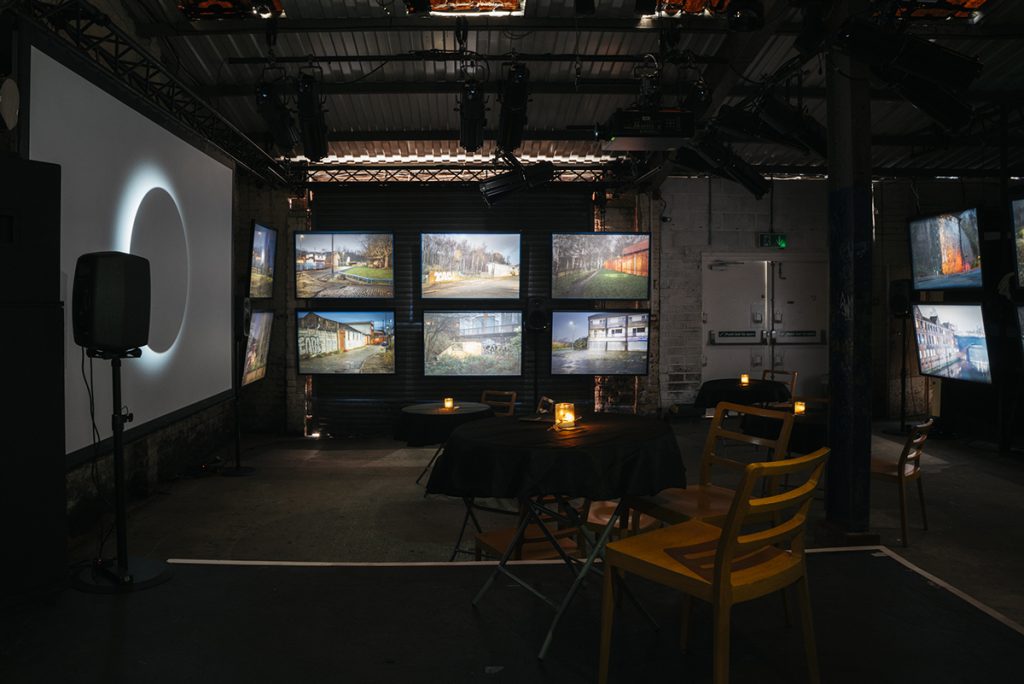
The key theme seems to be light. Or perhaps the lack of it, suggesting that in a reverse of normality, our days have been dark, our nights somehow safer, curfewed and cocooned as we have been in our little illuminated holes. And that speaks to me, as I did the whole of Lockdown in a one room studio apartment, mostly just trying to keep out of my own way; 23 hours a day in one room, with an hour out for Boris-sanctioned exercise. I can almost empathise with those currently nearby, within Strangeway’s walls.
Here, the processed images are themselves illuminated by spotlights, whose brightness ebbs and flows so that the images almost throb. The locations feel recognizable but disconcerting; normalised but strange – dark, menacing, devoid of the presence, and the company of human beings, the one key driver in making this last year so tough. There is a little of the Edward Hopper in that… that we are denied the light that baths the Nighthawks. The people are all inside, and together, while we are alone and on the outside, a voyeur, lurking besides run-down shops, forgotten cheap housing and decaying mills not yet touched by the hand of gentrification.
But there is a hand coming. Once seated at one of the (of course socially-distanced) tables, Simon Buckley’s film starts. We see the same scenes again – the River Irk, Angel Meadows (where 40,000 bodies are buried), tunnels where shadows play like Nosferatu on the walls – but now these scenes come to some kind of after-dark, moving life. And now there is a threat: the performance artist, Blackhaine, placed ominously into these scenes, the light in his hand almost a weapon that he uses to carve into the air, contorting awkwardly, violently, in pursuit of people and perhaps the city itself. (At one point Blackhaine stretches out his arms, to gather the entire city in what might be a violent embrace). His light is red and menacing, the pursed seeking comfort in the artificial white light of the city.
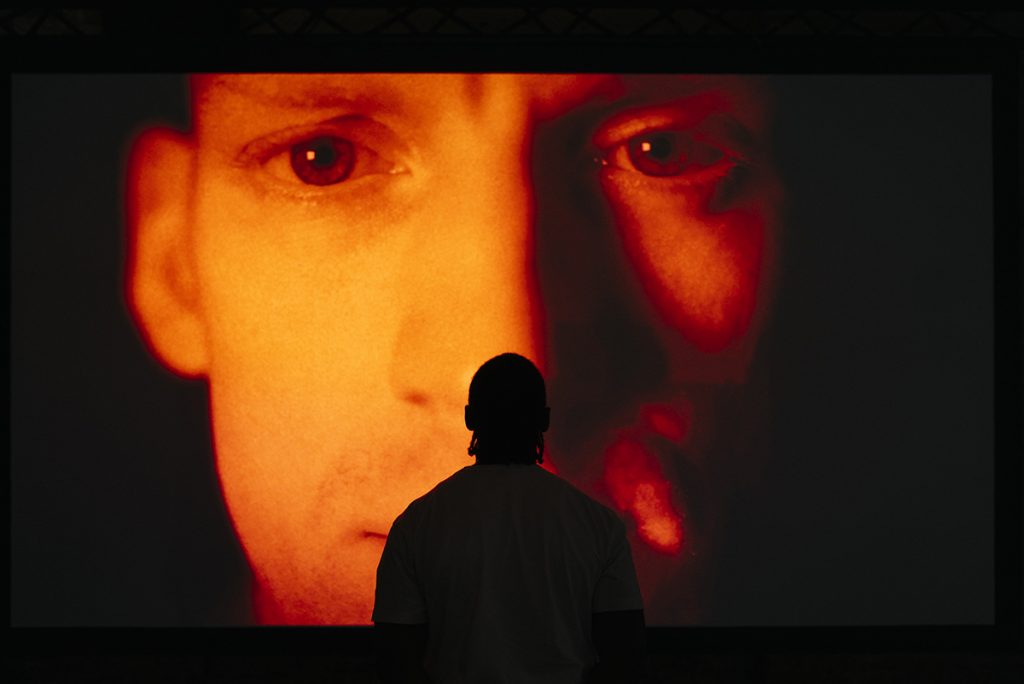
To say anymore is to move into the realms of plot spoilers, and let’s leave that to Peter Rabbit 2. (I’ve not seen it, but I’m going to go out on a limb and say it’s probably awful). Unlike Mr McGregor’s vegetable patch, the soundtrack to these streets assists the oppressive atmosphere – music from the likes of Bartók recorded by Manchester Collective – and the coda of Ewan MacColl’s ‘Dirty Old Town’ is almost a sonic sorbet to cleanse the soul. Until you leave the building through a different entrance and realise something rather unsettling…
Dark Days, Luminous Nights is at The White Hotel, Salford from 3-10 June 2021. Visit manchestercollective.co.uk for details.
Manchester Collective’s Adam Szabo talks about creating art to shock us out of our pandemic rut.

